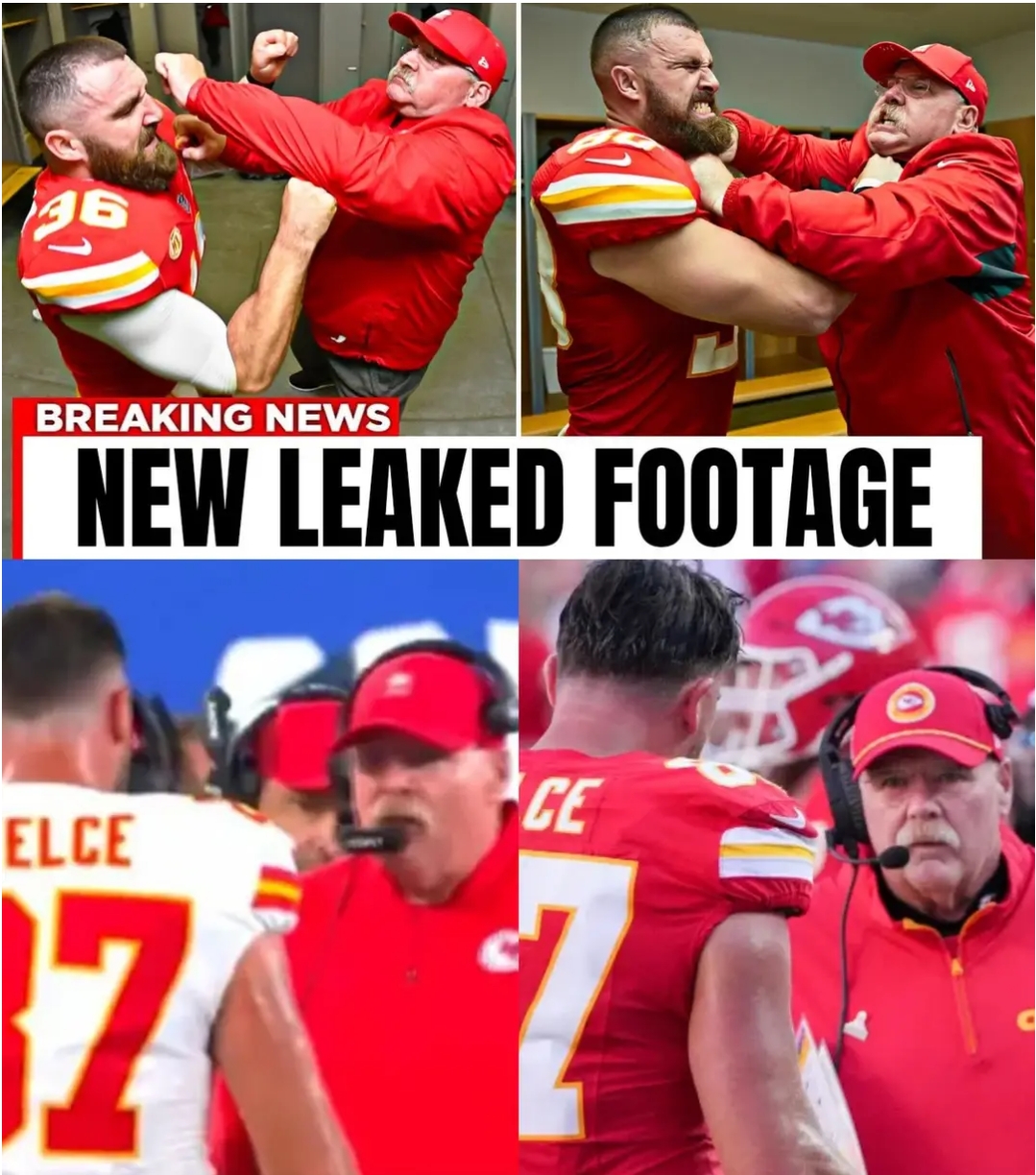CELEBRITY
Shocking Revelation: Latest Clash Between Travis Kelce And Andy Reid Puts The Future Of The Kansas City Chiefs In Question BB

The Kansas City Chiefs built an empire on a foundation of supreme talent, brilliant strategy, and something often more potent: fiery relationships. Among them, the bond between head coach Andy Reid and star tight end Travis Kelce has always stood out. This partnership, known for its deep connection and “trial by fire” moments, recently faced a severe test when heated footage of their confrontation during the September 22, 2025, game against the Giants went viral, revealing cracks deeper than ever before. This wasn’t just another sideline spat; it was a clash that could shake their legendary partnership to its core, and believe me, it’s far worse than fans realize.
Picture the scene: MetLife Stadium, Sunday Night Football, with millions of national television viewers watching. The defending champion Kansas City Chiefs were struggling through another sluggish start to their season. The atmosphere was electric with over 82,000 fans, but the energy on the Chiefs’ sideline told a different story entirely. The Chiefs entered this game with a 0-2 record, their worst start since Andy Reid arrived in Kansas City over a decade ago. The pressure was mounting with each failed drive, each missed opportunity, each moment reminding everyone that this wasn’t the same dominant Chiefs team that had captured hearts and championships.
Travis Kelce, at 36 years old and in what many speculate could be his final season, had managed just six catches for 45 yards through the first two games of the year. These weren’t just disappointing statistics; they represented a seismic shift for a player who had redefined the tight end position and become Patrick Mahomes’s most trusted target. The frustration was palpable in his every gesture, from his animated actions during team meetings to his increasingly agitated demeanor on the sideline. Some analysts even suggest his age and the knowledge that he can no longer influence games as he did in his prime have everything to do with his outbursts. Kelce is a player full of personality; he knows he’s not what he used to be, and because of that, he can’t compensate for the loss of a Rashee Rice or a Xavier Worthy.
The game started with promise, but as the first half wore on, it became increasingly clear that the Chiefs were struggling to find any sort of offensive rhythm. Drive after drive ended in punts, field goals, or worse, with the team managing just 130 yards of total offense in the first half. The Giants’ defense, led by coordinator Wink Martindale, was systematically dismantling the Chiefs’ attack with a combination of aggressive pass rush and disciplined coverage that left Mahomes looking frustrated and confused. Late in the first half, with the Chiefs trailing and their offense sputtering once again, the tension that had been building finally reached its breaking point. What happened next would be captured by NBC’s cameras and instantly become one of the most talked-about moments of the entire NFL season.
Sources indicate that Kelce was frustrated not just with the play-calling but with his own performance and the team’s inability to execute in crucial moments. The tight end began what can only be described as an emotional outburst, his voice rising above the ambient noise of the stadium as he vented his frustrations to anyone within earshot. The immediate reaction from analysts and former players captured the shock of the moment. “It is Travis Kelce now, is it toxic? It is, but it’s effective though,” Amina said. “And I think this is a sign that frustration is mounting.” But the truth was that nobody had seen this before, not from Andy Reid, not in this context, and certainly not with this level of physical assertiveness from a coach known for his measured approach to conflict resolution.
To truly understand the significance of what happened on that September night, we need to examine the broader context of the Chiefs’ early-season struggles and the mounting pressure that had been building within the organization. This was a team that had entered the season as defending champions but found themselves facing questions about their offensive capabilities that hadn’t been asked in years. The offense that had once been the gold standard of efficiency and explosiveness was now averaging just 17.5 points per game through their first two contests, a precipitous drop that had fans and analysts wondering if the Chiefs’ championship window was beginning to close.
Patrick Mahomes, the quarterback who had been virtually unflappable throughout his career and who had established himself as one of the most clutch performers in NFL history, was showing signs of the mounting pressure. His completion percentage had dipped to 62.5% through the first three games, well below his career standards and a concerning indicator of timing issues within the passing game. The running game was inconsistent, with Isiah Pacheco being held under 50 yards in two of the first three games, forcing the Chiefs to become overly reliant on a passing attack that was clearly struggling to find its identity.
For Kelce specifically, the early-season struggles represented something far more profound than just statistical shortcomings or temporary growing pains. This was a player who had dominated his position for over a decade, who had been Patrick Mahomes’s security blanket through three Super Bowl victories, who had redefined what it meant to play tight end in the modern NFL. At 36 years old, with questions swirling about his future and retirement plans, every game felt like it could be part of his farewell tour. The pressure to perform wasn’t just about helping his team win games; it was about validating a legendary career and ensuring that his final chapter would be written on his own terms.
The personal pressures on Kelce extended far beyond the football field and into realms that few NFL players ever have to navigate. His high-profile relationship with Taylor Swift had thrust him into a level of celebrity that transcended sports entirely, bringing with it a constant media spotlight and scrutiny that affected every aspect of his life. Media obligations, podcast commitments, and the constant attention that comes with dating one of the world’s biggest pop stars had some questioning whether his focus remained entirely on football. The pressure to perform wasn’t just about winning games anymore; it was about proving that his priorities remained in the right place and that his legendary work ethic hadn’t been compromised by his newfound fame.
Against the Giants, all of these frustrations, pressures, and concerns finally reached their boiling point in spectacular fashion. The incident occurred in the closing minutes of the first half, after the Chiefs had managed just two field goals on six offensive possessions. The offense had gained a mere 130 yards in the first half, a shockingly low output for a unit that had once been among the most explosive and creative in the entire NFL. As the players made their way to the sideline following another unsuccessful drive that had ended in yet another punt, the emotional dam that had been holding back weeks of frustration finally burst in the most unexpected way possible.












